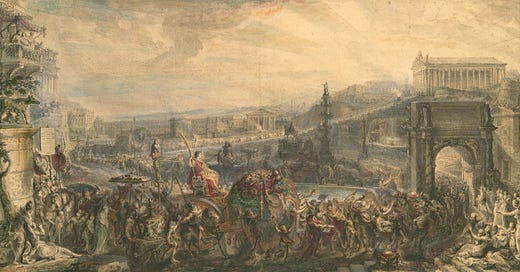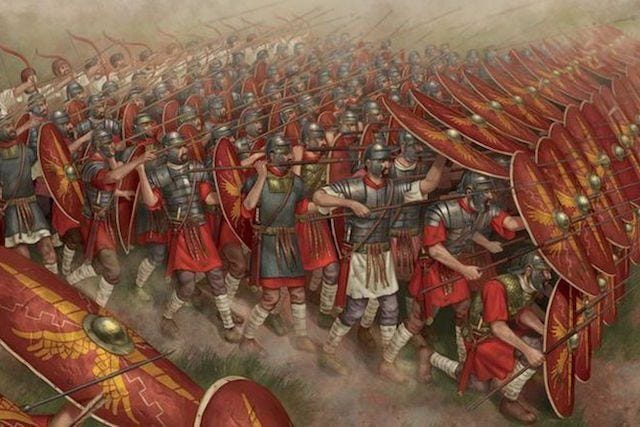On this day in 48 BC, the decisive battle of Caesar's Civil War was fought. Julius Caesar and his allies formed up the opposite army of the Roman Republic under the command of Pompey.
Pompey had the backing of a majority of Roman senators and his army significantly outnumbered the veteran Caesarian legions. Pressured by his officers, Pompey reluctantly engaged in battle.
Following the start of the Civil War, Caesar captured Rome, forced Pompey and his allies to withdraw from Italy, and defeated Pompey's legates in Spain. In the campaign season for 48 BC, Caesar crossed the Adriatic and advanced on Dyrrachium. There, he besieged it but was defeated.
Caesar then withdrew east into Thessaly, partly to relieve one of his legates from attack by Metellus Scipio's forces arriving from Syria. He besieged Gomphi after it resisted him. Pompey pursued, seeking to spare Italy from invasion by concluding the war on Greek soil, to prevent Caesar from defeating Metellus Scipio's forces arriving from Syria, and continued under pressure from his overconfident allies who accused him of prolonging the war to extend his command.
According to Caesar, his own army included 22,000 Roman legionaries distributed throughout 80 cohorts (8 legions), alongside 1,000 Gallic and Germanic cavalry. All of Caesar's legions were understrength; some only had about a thousand men at the time of Pharsalus, due partly to losses at Dyrrhachium and partly to Caesar's wish to rapidly advance with a picked body as opposed to a ponderous movement with a large army.
Historians describe Pompey as having 88 cohorts of Roman infantry, which at full strength would come to 44,000 men, while others estimate Pompey's Roman infantry as being 38,000 men.
It was in his auxiliary troops and in particular his cavalry, all of which vastly outnumbered Caesar's own, that Pompey derived his greatest advantage. He seems to have had at his disposal anywhere between 5,000 and 7,000 cavalry, and thousands of archers, slingers, and light infantrymen in general. These all formed a remarkably diverse group, including Gallic and Germanic horsemen alongside all polyglot peoples of the east – namely Greeks, Thracians, and Anatolians from the Balkans and Syrians, Phoenicians and Jews from the Levant.
There was significant distance between the two armies, according to Caesar. Pompey ordered his men not to charge, but to wait until Caesar's legions came into close quarters; Pompey's adviser Gaius Triarius believed that Caesar's infantry would be fatigued and fall into disorder if they were forced to cover twice the expected distance of a battle march.
As Pompey's infantry fought, Labienus ordered the Pompeian cavalry on his left flank to attack Caesar's cavalry; as expected they successfully pushed back Caesar's cavalry. Caesar then revealed his hidden fourth line of infantry and surprised Pompey's cavalry charge; Caesar's men were ordered to leap up and use their pila to thrust at Pompey's cavalry instead of throwing them.
After failing to reform, the rest of Pompey's cavalry retreated to the hills, leaving the left wing of his legions exposed to the hidden troops as Caesar's cavalry wheeled around their flank. Caesar then ordered his third line, containing his most battle-hardened veterans, to attack. This broke Pompey's left-wing troops, who fled the battlefield.
Pompey lost the will to fight as he watched both cavalry and legions under his command break formation and flee from battle, and he retreated to his camp, leaving the rest of his troops at the center and right flank to their own devices.
He ordered the garrisoned auxiliaries to defend the camp as he gathered his family, loaded up gold, and threw off his general's cloak to make a quick escape. As the rest of Pompey's army was left confused, Caesar urged his men to end the day by routing the rest of Pompey's troops and capturing the Pompeian camp.
Pompey, despairing of the defeat, fled with his advisors overseas to Mytilene and thence to Cilicia where he held a council of war. Pompey's council of war decided to flee to Egypt, which had in the previous year supplied him with military aid.
Pompey eventually made his way to Egypt and was assassinated upon his arrival at the order of Ptolemy XIII.
Caesar's victory took him to the pinnacle of power, effectively ending the Republic. The battle itself did not end the civil war but it was decisive and gave Caesar a much-needed boost in legitimacy. Until then much of the Roman world outside Italy supported Pompey and his allies due to the extensive list of clients he held in all corners of the Republic.
This allowed Caesar to parlay this single victory into a huge network of willing clients to better secure his hold over power and force his enemies into near exile in search of allies to continue the fight against Caesar.
#ThisDayInHistory
August 9, 48 BC







I love "This Day in History!"
What a phenomenal read. Wow.